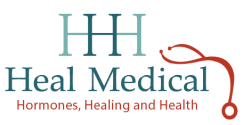Food and Nutrition: Carbs, Fats, Sugar: Will the Real Culprit Please Stand Up?
(HealthNewsDigest.com) – San Francisco, CA, May 25, 2016 – For more than fifty years, we’ve suffered whiplash as each new scientific study seemed to contradict the preceding one and en masse, we changed our diets to conform to the latest nutritional advice – advice that was supposed to keep us healthy and slim. And what happened? We got fat. According to the NIH, more than 2 in 3 American adults are considered to be overweight and more than 1 in 3 adults are considered to be obese.
“The problem was both a general one and a specific one,” says functional medicine specialist Dr. Marsha Nunley, founder of H.E.A.L. Medical. “The general problem was that we focused our attention on nutrients rather than on food. We tried to figure out which nutrients to eat rather than which foods to eat. The most notable specific example was the rush to eliminate fats, especially saturated fats, from our diets. We took polyunsaturated oils and put them through a process called hydrogenation which stabilizes the oil so it does not go rancid. The bad news is that this process creates trans fats which have been shown to be particularly bad for the heart and even related to some cancers. So we took them out of our processed food, right? Well, no. The FDA said that the products could contain 0.5 grams of trans fat per serving and still be called trans fat free. So the processed food companies changed the serving size but did not remove the trans fat. So we replaced the saturated fat with refined grains, sugar, salt, and left the trans fat in. If the label says, partially hydrogenated or hydrogenated oil, it contains trans fat.
Even though we weren’t losing weight, we were completely convinced that eliminating saturated fat from our diets was preventing heart disease. Nutritional evidence suggests that replacing saturated fats with trans fats and sugar had a devastating effect on our health. New studies now suggest that the saturated fats found in meat and full-fat dairy may not be directly linked to heart disease, stroke, type 2 diabetes or overall mortality in healthy adults. These findings reverse decades of nutritional advice (BMJ, http://bit.ly/1hx3RBV). But how do we know whether this latest research can be trusted or whether it will be overturned by the next study? “We should treat each new revelation with caution,” says Dr. Nunley, “and eat a balanced diet focused not on specific nutrients but on real foods.” Dr Nunley offers these tips for healthy eating:
- Cook your own meals at home, using whole foods.
- Eat a wide variety of whole grains like faro, quinoa, barley, brown rice, millet, whole oats and plant-based foods and limited amounts of grass fed meats and dairy products.
- Limit packaged foods; avoid high levels of sodium and sugar; avoid high fructose corn syrup.
- Eliminate polyunsaturated fats like the hydrogenated oils (corn, soy, safflower) found in processed foods and margarine.
- Add fermented foods – yogurt, kimchi, sauerkraut – to your diet.
- Don’t eat anything with a long list of unpronounceable ingredients. Read the labels.
- If you are struggling with your weight, new studies say you need to reduce your calories and increase your exercise for sustained weight loss.
“Don’t pay too much attention to studies that focus on the effects of a single nutrient” says Dr. Nunley. “Whole foods offer benefits that go beyond the sum of their parts. A healthy diet is based on eating food, not nutrients, in modest amounts, and preferably cooked yourself using fresh ingredients.” Put simply by Michael Pollan, “Eat food. Not too much. Mostly plants.” Marsha Nunley, M.D., founder of H.E.A.L. Medical is board-certified in internal medicine, geriatric medicine, and palliative care. Dr. Nunley specializes in functional medicine, a systems-based approach to treating the whole person.www.marshanunleymd.com

